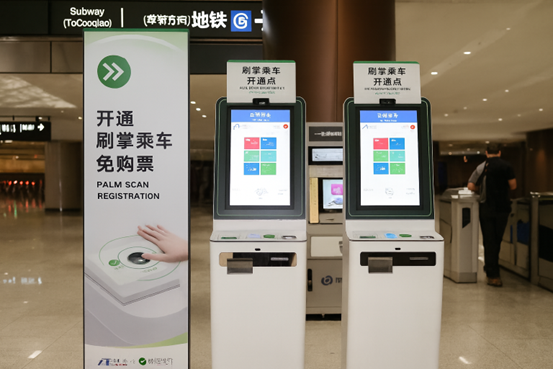🌐 Introduction
As biometric payments grow rapidly across global markets, palm recognition is emerging as one of the most secure and intuitive verification methods.
Yet one fundamental question still challenges many developers and financial institutions:
“If smartphones already have advanced cameras, why can’t they be used for palm registration?”
The answer lies in data security, imaging depth, and compliance requirements.
By analyzing the WeChat Pay Palm Pay model, X-Telcom demonstrates why RGB + IR (visible and infrared) scanners are essential for reliable biometric registration — and how this standard is shaping the future of digital payments.
🔒 The WeChat (Tencent) Palm Pay Registration Framework
1️⃣ Registration Entry
- Users initiate palm registration inside the WeChat App, usually under WeChat Pay → Biometrics → Palm.
- The smartphone only acts as an authorization interface, not a biometric capture tool.
- Tencent confirmed that it previously allowed camera-based registration, but this method was discontinued due to low accuracy and security vulnerabilities.
- Today, all valid registrations must be completed via RGB + IR Palm Vein Scanner terminals, not through smartphones.
2️⃣ Registration Method
Palm registration requires certified hardware capable of capturing both visible and infrared imagery — a process no smartphone camera can reproduce.
Industry-standard process:
- The user agrees in the WeChat App to activate Palm Pay.
- The user visits a certified terminal, kiosk, or gate with a palm vein scanner.
- The scanner captures both RGB (surface) and IR (subcutaneous vein) images simultaneously.
- The data is encrypted immediately and transmitted securely to WeChat Pay’s backend, where a unique palm token is generated.
3️⃣ Data Binding and Storage
- The terminal does not store any biometric data locally.
- All palm data is encrypted and securely stored within Tencent’s backend.
- Each Palm ID is linked to the user’s WeChat Pay account and associated banking information.
This closed data loop ensures privacy protection and payment-grade security.
4️⃣ Usage Scenarios
After registration, users can make payments or verify identity by simply waving their palm over a scanner — no phone or card needed.
Applications include:
- Public transportation (bus, metro, station gates)
- Retail checkout and self-service kiosks
- Access control and secure identity verification
The entire system depends on RGB + IR imaging hardware, not consumer-grade cameras, to maintain consistency and safety.
📸 Why Smartphone Cameras Fall Short
Even the most advanced smartphone cameras are designed for color imagery, not biometric vein capture.
Palm vein recognition depends on infrared illumination, which reveals vein structures invisible to human eyes.
| Limitation | Explanation |
|---|---|
| No Infrared Capability | IR imaging is required to detect subcutaneous vein patterns — standard RGB cameras cannot see beneath the skin. |
| Unstable Lighting | Ambient light, distance, and hand movement affect smartphone accuracy. |
| No Real-Time Encryption | Certified palm devices encrypt biometric data instantly; phones lack secure hardware modules for payment use. |
For this reason, RGB + IR scanners remain the only trusted choice for palm-based payment registration and verification.
💡 X-Telcom’s RGB + IR Palm Vein Technology
At X-Telcom, we have developed RGB + IR Palm Vein Technology that delivers payment-grade performance, precision, and security for large-scale deployments.
Core Advantages:
- ✅ Dual-spectrum imaging (RGB + IR): Captures both surface and vein-level features for unparalleled accuracy.
- ⚡ Fast Recognition: Up to 0.35-second verification with 99% accuracy across multi-million ID databases.
- 🧠 AI-driven algorithms: Combine visible and infrared data for robust performance in varied environments.
- 🔒 Secure Encryption: On-device data protection with full SDK/API integration for payment and identity systems.
Available Device Series:
- XT-WavePass500 Android Palm Vein Payment Terminal
- XT-PalmVein01 USB Palm Vein Reader (Windows / Linux / Android)
These solutions empower financial institutions, transport networks, and government platforms to deploy secure, touch-free identity systems at scale.
🌍 Global Application and Industry Outlook
The model proven by WeChat Pay has redefined expectations for biometric authentication.
Now, X-Telcom’s Palm Vein Technology extends this success worldwide — enabling partners in Asia, the Middle East, Africa, and Latin America to adopt palm-based registration and verification.
Implementation benefits include:
- Seamless integration with digital wallets and fintech ecosystems
- Hardware-level encryption ensuring privacy and compliance
- Scalable use in transportation, retail, and enterprise access control
✅ Conclusion
A smartphone camera captures what you see. A Palm Vein Scanner captures who you are.
The industry lesson is clear: consumer devices cannot provide the security or precision required for biometric payments.
Only RGB + IR Palm Vein Technology — built and perfected by X-Telcom — ensures the accuracy, encryption, and trust that financial systems demand.
🌐 Learn more:https://x-telcom.com/palm-vein-reader/
Tags:
#XTelcom #PalmVeinTechnology #WeChatPay #PalmPay #BiometricPayment #ContactlessPayment #Fintech #AI #Security #Innovation #DigitalIdentity



